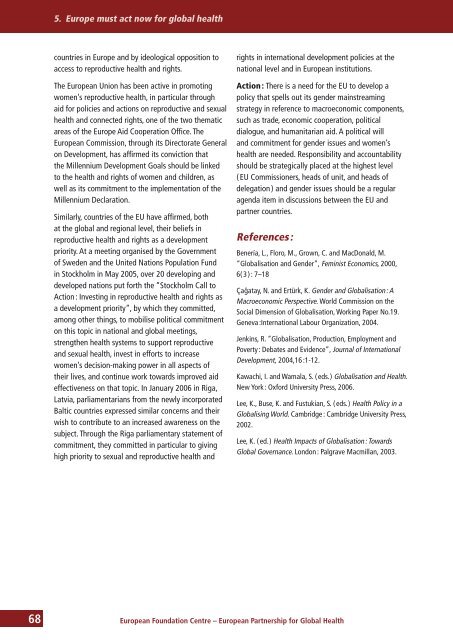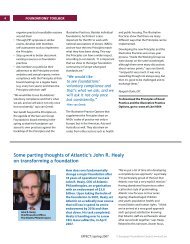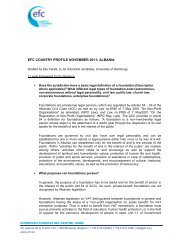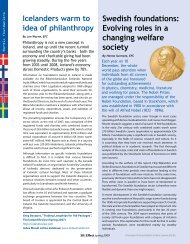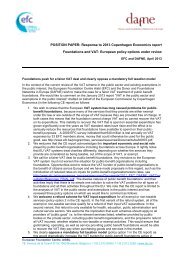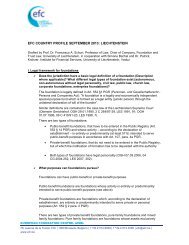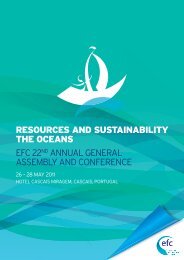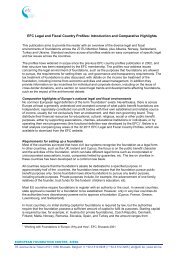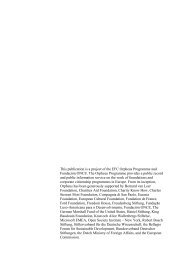European perspectives on global health: a policy glossary
European perspectives on global health: a policy glossary
European perspectives on global health: a policy glossary
Create successful ePaper yourself
Turn your PDF publications into a flip-book with our unique Google optimized e-Paper software.
5. Europe must act now for <strong>global</strong> <strong>health</strong><br />
countries in Europe and by ideological oppositi<strong>on</strong> to<br />
access to reproductive <strong>health</strong> and rights.<br />
The <str<strong>on</strong>g>European</str<strong>on</strong>g> Uni<strong>on</strong> has been active in promoting<br />
women’s reproductive <strong>health</strong>, in particular through<br />
aid for policies and acti<strong>on</strong>s <strong>on</strong> reproductive and sexual<br />
<strong>health</strong> and c<strong>on</strong>nected rights, <strong>on</strong>e of the two thematic<br />
areas of the Europe Aid Cooperati<strong>on</strong> Office. The<br />
<str<strong>on</strong>g>European</str<strong>on</strong>g> Commissi<strong>on</strong>, through its Directorate General<br />
<strong>on</strong> Development, has affirmed its c<strong>on</strong>victi<strong>on</strong> that<br />
the Millennium Development Goals should be linked<br />
to the <strong>health</strong> and rights of women and children, as<br />
well as its commitment to the implementati<strong>on</strong> of the<br />
Millennium Declarati<strong>on</strong>.<br />
Similarly, countries of the EU have affirmed, both<br />
at the <strong>global</strong> and regi<strong>on</strong>al level, their beliefs in<br />
reproductive <strong>health</strong> and rights as a development<br />
priority. At a meeting organised by the Government<br />
of Sweden and the United Nati<strong>on</strong>s Populati<strong>on</strong> Fund<br />
in Stockholm in May 2005, over 20 developing and<br />
developed nati<strong>on</strong>s put forth the “Stockholm Call to<br />
Acti<strong>on</strong> : Investing in reproductive <strong>health</strong> and rights as<br />
a development priority”, by which they committed,<br />
am<strong>on</strong>g other things, to mobilise political commitment<br />
<strong>on</strong> this topic in nati<strong>on</strong>al and <strong>global</strong> meetings,<br />
strengthen <strong>health</strong> systems to support reproductive<br />
and sexual <strong>health</strong>, invest in efforts to increase<br />
women’s decisi<strong>on</strong>-making power in all aspects of<br />
their lives, and c<strong>on</strong>tinue work towards improved aid<br />
effectiveness <strong>on</strong> that topic. In January 2006 in Riga,<br />
Latvia, parliamentarians from the newly incorporated<br />
Baltic countries expressed similar c<strong>on</strong>cerns and their<br />
wish to c<strong>on</strong>tribute to an increased awareness <strong>on</strong> the<br />
subject. Through the Riga parliamentary statement of<br />
commitment, they committed in particular to giving<br />
high priority to sexual and reproductive <strong>health</strong> and<br />
rights in internati<strong>on</strong>al development policies at the<br />
nati<strong>on</strong>al level and in <str<strong>on</strong>g>European</str<strong>on</strong>g> instituti<strong>on</strong>s.<br />
Acti<strong>on</strong> : There is a need for the EU to develop a<br />
<strong>policy</strong> that spells out its gender mainstreaming<br />
strategy in reference to macroec<strong>on</strong>omic comp<strong>on</strong>ents,<br />
such as trade, ec<strong>on</strong>omic cooperati<strong>on</strong>, political<br />
dialogue, and humanitarian aid. A political will<br />
and commitment for gender issues and women’s<br />
<strong>health</strong> are needed. Resp<strong>on</strong>sibility and accountability<br />
should be strategically placed at the highest level<br />
( EU Commissi<strong>on</strong>ers, heads of unit, and heads of<br />
delegati<strong>on</strong> ) and gender issues should be a regular<br />
agenda item in discussi<strong>on</strong>s between the EU and<br />
partner countries.<br />
References :<br />
Benería, L., Floro, M., Grown, C. and MacD<strong>on</strong>ald, M.<br />
“Globalisati<strong>on</strong> and Gender”, Feminist Ec<strong>on</strong>omics, 2000,<br />
6( 3 ) : 7–18<br />
Çaǧatay, N. and Ertürk, K. Gender and Globalisati<strong>on</strong> : A<br />
Macroec<strong>on</strong>omic Perspective. World Commissi<strong>on</strong> <strong>on</strong> the<br />
Social Dimensi<strong>on</strong> of Globalisati<strong>on</strong>, Working Paper No.19.<br />
Geneva :Internati<strong>on</strong>al Labour Organizati<strong>on</strong>, 2004.<br />
Jenkins, R. “Globalisati<strong>on</strong>, Producti<strong>on</strong>, Employment and<br />
Poverty : Debates and Evidence”, Journal of Internati<strong>on</strong>al<br />
Development, 2004,16 :1-12.<br />
Kawachi, I. and Wamala, S. ( eds. ) Globalisati<strong>on</strong> and Health.<br />
New York : Oxford University Press, 2006.<br />
Lee, K., Buse, K. and Fustukian, S. ( eds. ) Health Policy in a<br />
Globalising World. Cambridge : Cambridge University Press,<br />
2002.<br />
Lee, K. ( ed. ) Health Impacts of Globalisati<strong>on</strong> : Towards<br />
Global Governance. L<strong>on</strong>d<strong>on</strong> : Palgrave Macmillan, 2003.<br />
68 <str<strong>on</strong>g>European</str<strong>on</strong>g> Foundati<strong>on</strong> Centre – <str<strong>on</strong>g>European</str<strong>on</strong>g> Partnership for Global Health


